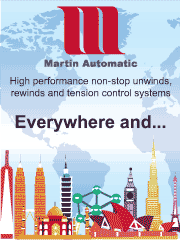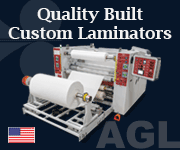Customer Satisfaction Begins and Ends with Quality
- Published: October 01, 2000, By Claudia Hine, Senior Editor
Corrugated Paper Products invests in new equipment and additives from National Starch and Chemical Co. in order to assure quick delivery as well as top quality products.
There is a mantra-like motto at Corrugated Paper Products (CPP), and it has to do with quality. Ask any of the 150 employees at the Mishawaka, IN, plant, about it and you'll hear: "Quality will be obtained by our commitment toward our products and performance through improved processes." Corrugator superintendent Brian Wisinski explains, "Every employee on the corrugating line has to understand—in detail—the importance of quality."
For both the standard shipping cartons and the custom, multicolor specialty cartons CPP supplies, quality means consistently high strength and maximum printability. For its more than 450 customers located throughout the Midwest, CPP also counts quick delivery as part of its quality operation.
Investing for Success
According to operations manager Mike Stone, "Finding ways to exceed customer expectations" is a daily challenge at the 300,000-sq-ft facility, and recent changes at the plant help employees achieve that goal. The privately held company, which is a member company of the Mack Packaging Group, Chicago, IL, has invested $23 million during the last three years.
On the wet end, CPP relies on two single-facers and a double-backer from United, as well as a Marquip Pyro Press system. At the dry end, Fosber equipment includes a rotary shear, slitter/scorer, cut-off knife, and double stackers. Typical runs are from 85-98 in. wide.
A Ringwood automatic starch system makes 260-gal batches using Hy-Shear carrier starch from National Starch and Chemical Co. CPP tests high quality paper from various suppliers and uses it to manufacture the corrugated board, which meets the stringent requirements of many types of customers, including those in the automotive, pharmaceutical, and medical industries.
The corrugator production team prefers this specialty starch because it has proven to be consistent from batch to batch, Wisinski explains. "The more consistent the paper and starch, the better the end product."
Keeping Quality Under Control
CPP earned ISO-9000 certification this year. "That was huge for us," says Wisinski, "especially with the automotive industry and how particular a lot of the customers can be today."
Quality assurance at the company results from routine testing. Incoming paper is checked for moisture as well as caliper. Starch gel temperature and viscosity are checked and adjusted if needed. "Having these at the correct level allows us to set parameters and machine controls to ensure that the corrugated board quality remains consistently high," Wisinski notes.
Other routine tests include edge crush testing, iodine soak tests, and caliper testing for every board grade. Occasionally, dry pin adhesion and ring crush tests are performed also, says quality assurance manager John Ferguson. Testing Machines Inc. supplies the company's compression tester.
Beyond this testing, corrugating machine operators watch the board quality as soon as it's stacked. They look for warp, stiffness, pressure lines on the single-face, bond quality, score depth, and any indication of mottling and washboarding. "We've taught our operators what to see and feel," says Wisinski. "I tell them repeatedly: `Imagine this corrugated is coming to your home. How would you want it to perform and look?'"
Waste Is Down, Speed Is Up
"Before I came to CPP in mid-'98, waste was at about 12 percent. Now we have this level down below 6 percent," Wisinski says, adding that the financial investments and the switch to a better performing type of carrier starch play an important role in waste reduction.
"You know, the more you learn about operating the equipment you work on every day, the more you learn about short cuts, tricks, and things like that. We did a lot of teaching, held a lot of seminars, and developed processes and procedures. We're starting to see the results."
Plans call for continuing to reduce waste to levels of at least 4%-5%.
In addition, the modern corrugator and the specialty carrier starch have resulted in an increase in average corrugator speed. The company is getting better consistency using less adhesive. "Early in 1999 we tested various types of carrier starches from several suppliers. The Hy-Shear starch gave the best results and has proven to be very consistent from batch to batch," says Wisinski. "We typically make six batches in a ten-hour shift, two shifts a day, four or five days per week, so we now have plenty of experience with it. This starch also allows us to cut back on consumption."
Communication Brings Benefits
Consistency and fast machine speed are crucial to enabling the company to change board grades frequently, and, notes Mike Stone, this ability to change board grades is a service issue. "Being able to quickly fill orders to meet customer needs helps us reach and keep new customers. Our talented design team also helps us attract new customers and favorably impress long-term customers."
CPP designers sometimes visit customer operations to study their needs. The company reports that these visits and an intimate understanding of customer needs have, at times, allowed it to offer better products for less cost.
Says Stone, "In today's competitive business environment, this `help-your-customer-prosper scenario' goes a long way toward establishing `most-valuable-supplier status.'"
He offers an example in which CPP's design team helped a customer save considerable sums of money by suggesting the use of a special insert to stabilize a product and pack it with another product in the same container rather than sending two boxes even though the products were dissimilar.
Wisinski provides another example of helping a customer solve a problem, with help from National Starch: "One of our customers needed a container with antistatic properties. Because National Starch's Vinamyl II starch was able to adhere successfully to a special type of paper designed for this use, we were able to fill the order for a new customer. Vinamyl allows us to penetrate the fibers in the board to get a good bond."
Today approximately 75% of CPP's business includes some printing. The company has upgraded two presses—a 50-in. two-color model and a 174-in. one-color S&S—to flexographic capability.
Two Langston Staley die-cutters offer two-color printing, and a United Robotix flexo gluer has two-color printing and in-line die-cutting capabilities. A Martin Mini flexo folder/ gluer also has two-color printing capabilities and the ability to die-cut in-line.
It's clear that customer satisfaction is CPP's goal, and the company backs it up with aggressive investment, careful selection of raw materials, and routine training of employees to enable them to be a valuable resource for customers. All of that adds up to a company with a competitive edge.
Supplier Information
National Starch and Chemical Co., Bridgewater, NJ; 908/685-5000; 800/797-4992; nationalstarch.com
United Agnati, Glen Arm, MD; 410/592-5400
Marquip Inc., Phillips, WI; 715/339-2191; marquip.com
Fosber America Inc., Green Bay, WI; 920/339-6100
Ringwood, Bedford Pk., IL; 708/458-6000; 800/RINGWOOD
Testing Machines Inc., Islandia, NY; 631/439-5400; testingmachines.com
S&S Specialty Systems, Iron River, WI; 715/372-8988; s-and-sspecialty.com
Langston Corp., Cherry Hill, NJ; 856/795-7100
Martin S.A. (Bobst Group), Villeurbanne-Cedex, France; +33 (0) 472-14-7474; bobstgroup.com/martin













